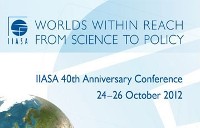22 October 2012
New findings on sustainable development, energy, climate, food and water at IIASA conference
How can science and policy come together to provide solutions to global problems? This week, conference participants will discuss the latest research on global issues like climate, food, water, and energy, at the IIASA 40th Anniversary Conference: Worlds Within Reach – From Science to Policy from 24-26 October, 2012.
The opening session on 24 October features speakers such as Austrian president Heinz Fischer, Nobel prize-winners Thomas Schelling, Carlo Rubbia, and international sustainable business leader Bjorn Stigson. Media are invited to a press conference following the opening session to ask questions of high-level speakers.
IIASA, the International Institute for Applied Systems Analysis, is an independent research institute that studies problems of global importance. Systems analysis combines detailed modeling work with a broad examination of interconnected areas. At the conference, IIASA scientists and researchers from around the world will present new findings in the areas of energy, climate change, food security, water resources, and ecosystems management.
Highlights
IIASA Director and CEO Prof. Pavel Kabat will highlight the role of systems analysis in supporting the sustainability goals of Rio+20. He says, “Narrowly focused, single-disciplinary science alone cannot adequately underpin policies and solutions to resolve major sustainability challenges.”
IIASA Deputy Director Nebojsa Nakicenovic will describe his vision for a sustainable future, based on IIASA’s unique brand of systems analysis. If we can get away from business-as-usual practices and policies, and transform our old systems into sustainable ones, says Nakicenovic, we can find our way to a more equitable and sustainable world.
Keywan Riahi will discuss key findings from the Global Energy Assessment (GEA), the first comprehensive global assessment of energy challenges, scenarios, and pathways for change. The report involved 300 authors and 200 reviewers worldwide, and was made available for free as an online PDF on 20 October, 2012.
Wolfgang Lutz will provide new findings from IIASA’s population projections to 2050, which project a world population of around 9 billion people in less than 40 years’ time. The projections have been analyzed by 600 international experts and their views will serve as the “human core” of new IPCC projections.
Michael Obersteiner will show that to balance the need for greater food with preserving the environment and biodiversity, we need a range of new efforts from individual lifestyle changes, shifts in human diets, to scientific inquiry that improves our understanding of land cover. Improving data about land cover can help lands be managed more intelligently to preserve the biosphere while also providing sufficient material goods for our survival and wellbeing.
Zbigniew Klimont will speak about recent findings of 14 “win-win” measures that would simultaneously benefit the climate, the environment, and human health. These measures must supplement, not replace efforts to reduce greenhouse gas emissions, says Klimont.
Sabine Fuss will present research showing how climate change will create more instability in many areas that link to food production, such as water, weather, and land use. Fuss’ research examines a variety of solutions geared towards several different climate scenarios, but finds that there is no one single solution that works across all possible scenarios.
David Wiberg will discuss the new World Water Scenarios project, a joint effort coordinate by IIASA, UNESCO, and other groups. The project defines a variety of scenarios, working with stakeholders and scientists to include the many factors, from climate, population, and agriculture, to determine how much water might be needed, and how much water will be available in 2050. The project aims to provide a toolbox for decision-making at local and international levels.
Details
The conference program is available at http://conference2012.iiasa.ac.at/program.html
A Media Kit is available with story ideas, contact information, speaker information, and more. http://conference2012.iiasa.ac.at/media_kit.html
The conference will be livestreamed via the web site: http://conference2012.iiasa.ac.at/stream.html.


